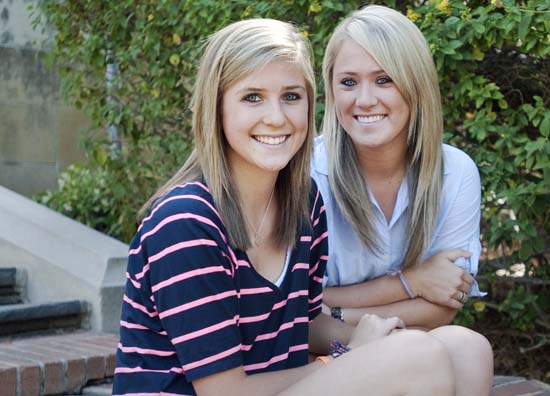CORRECTION: Sarah and Samantha Hofmann are in Kappa Delta.
Second-year twins Sarah and Samantha Hofmann share more than just their birthday and last name.
Both sisters are anthropology students, take the same classes, are in UniCamp together and share a room in their Kappa Delta sorority house.
Yet coming into college, they never imagined they would have so much in common. Though they spent their first year pursuing different majors and living in different dorms, Sarah and Samantha said they eventually found themselves together because of similar interests.
“As freshmen, we said we’d split up and meet our own friends, but we basically hung out all the time anyway and eventually had the same friends,” Sarah said.
Today, a panel titled “Everything You Want to Know About Twins” will be held to explore twin development, psychotherapy and genetics. Panelists will include some of the leading researchers in the field.
According to Shawn Whiteman, assistant professor of family studies at Purdue University, the transition between high school and college often alters sibling relationships because of the independence that comes with living away from home.
Once in college, siblings do not tend to spend a great deal of time together, evolving their familial bonds into a friendship instead, especially for twins, said Heidi Riggio, assistant professor of psychology at California State University, Los Angeles.
“Twins have a very special and different kind of relationship and tend to stick together into adulthood,” Riggio said. “Typically, siblings will check up on one another but have different groups of friends.”
According to panelist Nancy Segal, psychology professor at California State University, Fullerton, identical twins share a more intimate relationship than fraternal twins because they share a set of genes. Fraternal twins, on the other hand, view each other as ordinary siblings and possess different interests and personalities, she said.
The gender of siblings also plays a fundamental role in their closeness, Riggio said. Relationships involving females last longer and are more intimate. Riggio said her research showed sister-sister or brother-sister relationships often carry into adulthood, while brothers tend to share weaker bonds.
For third-year communication studies student Kerry Bradley and her younger sister, first-year undeclared student Ryan Bradley, their sisterhood blossomed into a deep friendship when Ryan entered UCLA, Kerry said.
“Being away from our parents, we rely on each other so much more,” Kerry said.
“Growing up, because we had our parents, we could go to them for guidance and advice on different things. Now, if I have a lot of things to do and I’m stressed, I go to my sister.”
Though siblings are removed from the expectations at home, their roles of birth order continue to cling to them regardless of parental presence, Whiteman said.
Often, the older sibling will take leadership, caring for the younger one and providing counsel.
“Because I’m older, I sometimes go into “˜mother’ mode when (Ryan) gets sick,” Kerry said. “I would walk her to Ashe and try to be responsible and make sure she’s OK.”
Twins, who are often associated with one another, will differentiate to avoid the pressure and negativity of competition, Whiteman said.
First-year twins Jonathan Chiang, a molecular, cell, and developmental biology student, and Austin Chiang, a business economics student, said through pursuing different majors they were able to develop themselves independently and better see their individual accomplishments.
“We try not to be branded as one person, because we get that a lot,” Jonathan said. “In high school, people would just refer to us as “˜the twins,’ as if one person’s achievements and failures became that of the other.”
Panelist Joan Friedman, author of “Emotionally Healthy Twins,” said such differentiation is not only natural, but also healthy.
“Being noticed for being a twin is not the same as being noticed as a person,” she said. “For identical twins, their only identity before was being a twin, and in college, they need their time apart.”
Yet going to the same college presents unique opportunities to grow a healthy relationship and bring siblings closer, Kerry said.
“The other day, I was sitting in Ackerman waiting to meet (Ryan) for lunch, and (she) walked in wearing literally the same outfit as me, head to toe, and everyone else around us just erupted into laughter.”
